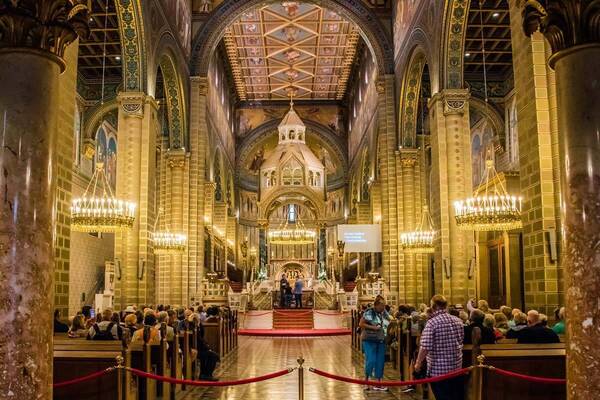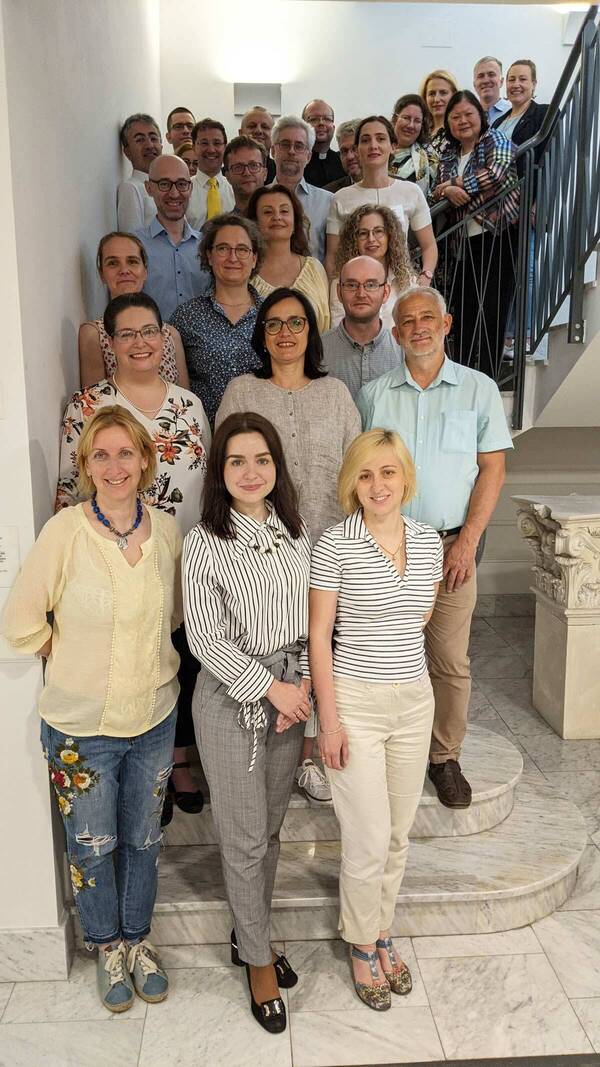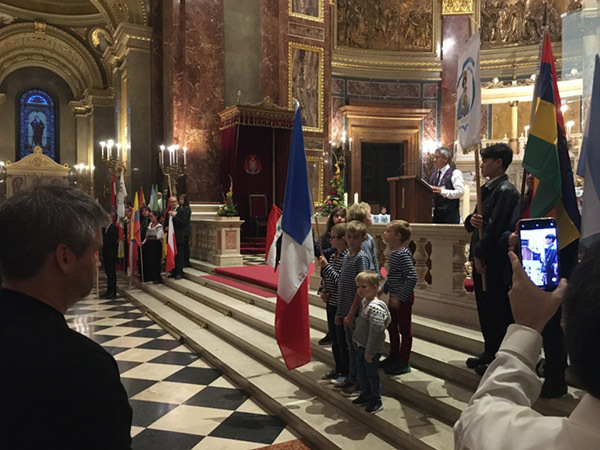
Richard Somorjai-Dörflein, JD was head of the Central Office for Foreign Affairs between 2020 and 2022 at Pázmány Péter Catholic University in Budapest, Hungary. He is currently an international consultant for rail transport. In June 2022, he participated in the Advanced Leadership Program in Rome, an initiative of the Catholic Universities Partnership facilitated by the Nanovic Institute for European Studies.
In approaching the Nanovic Institute’s Advanced Leadership Program in Rome, I was conscious that my contribution to the discussion would emerge from my executive administrative experience and, while I do not have an academic background, my expertise in the international support of academic life at the Pázmány Péter Catholic University, my former place of study. Founded in 1635, this institution experienced a disruption during the communist dictatorship in the middle decades of the 20th century but has been serving both Catholic academic and church life in Hungary as a member of the International Federation of Catholic Universities and the Federation of the European Catholic Universities.
We could say that my early family life has determined my career path. In particular, I was raised in a bilingual home where my mother kept her ethnic German identity and passed it on to her two sons. My parents worked hard to expand the limited possibilities of life in a socialist country. My father was a surgeon and my mother a commercial consultant, but in addition to these occupations, they also provided accommodation for East-German engineers and customer-service employees traveling to Hungary for business, with the official approval of the Embassy of the German Democratic Republic. This was my first, very present example of international cooperation within the communist bloc. Through the presence of these businesswomen and men, I was immersed in hospitality and cultural exchange. As a young boy, I was not fully aware of the political background, but I witnessed the more practical results of these relationships which involved not only the exchange of opinions but also material goods, like in every socialist regime, trading, for example, East-German household products for Hungarian delicacies and clothing.

Growing up in this environment, I quickly realized the necessity of broadening one’s spectrum, the need to travel, and to develop the skills necessary to cooperate with people from different points of origin. I have to admit, my perspective did not always match that of people in my immediate environment at school or in church. I never took issue with those who did not share my enthusiasm for broadening one’s understanding of the world and of different perspectives because I understood that their approach to knowing others might simply be different from mine.
Later, as a student and professional, I continued my “mission” to open our long-closed socialist societies to the rest of the world, and especially to reopen our caged Catholic communities to our unknown brothers and sisters in the Faith abroad. Some of my compatriots travel outside of Hungary, but a few days’ holiday abroad is insufficient for a rich and nuanced intercultural experience. Others seemed more like the baby elephant tied to a stake, not believing in its ability to cut the rope. For Hungarians, communication with people outside of our own country is particularly difficult. Our mother tongue has no close relatives and our system of grammar is entirely different from Indo-European languages so, unlike our Slavic neighbors who can cross their border to another Slavic country and make themselves readily understandable, communication with non-Hungarians requires us to make more of an effort and learn another, very different language. I have focused instead on everyday activities, and on using the language phrasebook as a tool in my hands while I enjoy travel, the company of others, dining, and entertainment. Being aware of the linguistic challenges I have always tried to convey to my classmates, fellow students, and colleagues my experience of staying abroad, either to study or for work, and encourage them to build relationships on an international level.
I have spent almost nine years living in the Czech Republic and Germany and remember those years as one of the best periods in my life. I owe special gratitude to my former colleagues at the Prague office of the University Studies Abroad Consortium (USAC), who gave me the chance to work with them despite having almost no knowledge of the Czech language. This was learning by doing, while my colleagues and friends had the harder task of communicating with me in Czech with the patience required to listen to a beginner. After a year I was fluent in Czech and I am still able to use it as a working language. During my five years in Prague, I also had the opportunity to exchange thoughts with visiting students and professors from the United States and share with them the culture, history, and lifestyle of Central and Eastern Europe. We gave lectures about history, art, politics, literature, and music, and went on hikes and study tours in the Czech Republic, Slovakia, Austria, Hungary, and Germany. I added my own life experience in these locations to our students’ learning and both the students and their professors greatly appreciated such an attitude of openness and support for international studies. This was my greatest and most rewarding experience so far, which demonstrated to me the importance of having an international dimension within university education.

Catholic Universities have a unique opportunity and a network that they can utilize to foster student and academic exchange. The oldest and most widespread universal organization on earth — the Catholic Church — stands behind them. In recent times, the globalizing world with all its challenges also brought opportunities: travel and living abroad, visiting partners, and keeping in touch are all easier to do in the 21st century. This, however, is a very recent development compared to the long history of our Church. One might have the impression that the members of this institution spent most of their lives serving their parish and community, focusing on a limited number of people and within a small location, living parallel lives to others around the world, divided by the cultural, political, and geographical frontiers. To some extent this has been true: most of the priests we know in our region have been serving in one country, and a few exceptions have had the opportunity to take the path of the Apostles and visited or even served different communities around the world. I am lucky to be a member of the German Catholic Community in Hungary and to have a parish priest from Austria. In October 2022, we celebrated the Holy Mass of the Nations in Budapest. It was a truly overwhelming ceremony where one could feel that a truly universal community of believers was brought together. We left the ceremony with a strengthened faith seeing how many we are in this world, a big, real family. If we utilize this network, involve more individuals from the national churches, and bring together priests, community servants, and members we could reach a much better understanding of our differences while discovering our similarities.
I have often met people who were reluctant to open their perspectives to foreign relations, and I have consistently looked for incentives and examples to change their points of view. The Advanced Leadership Program helped me in this endeavor by bringing together Catholic people from all around the globe, giving us the chance to exchange thoughts, views, and strategies designed to improve and protect our common future. Although the journey that will take us to closer cooperation and a better understanding of each other is still a long one, we can look to historic examples: the Lord creating his Church beyond regions and countries, Papal tours, and the constantly growing network of Catholic partnerships such as that facilitated by the Nanovic Institute and the University of Notre Dame. These examples give me confidence that these are the right ways to pursue relationships extending beyond the frontiers of one country or continent. A safe landing is promised, and, having experienced it already, I firmly believe that it lies ahead.